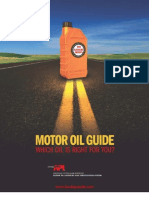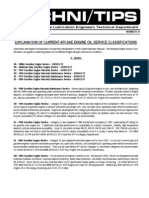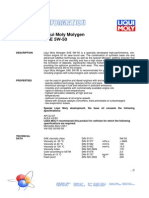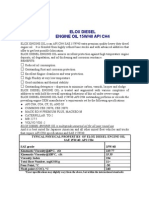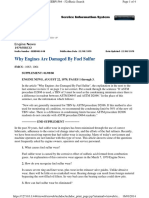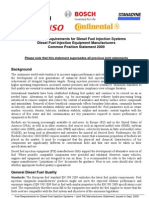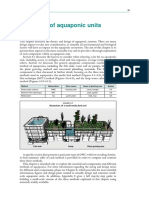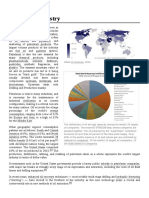Sales Engineering Information: 4.04. Fuel Specification For DAF Diesel Engines
Sales Engineering Information: 4.04. Fuel Specification For DAF Diesel Engines
Uploaded by
Bartek GrzybowskiCopyright:
Available Formats
Sales Engineering Information: 4.04. Fuel Specification For DAF Diesel Engines
Sales Engineering Information: 4.04. Fuel Specification For DAF Diesel Engines
Uploaded by
Bartek GrzybowskiOriginal Title
Copyright
Available Formats
Share this document
Did you find this document useful?
Is this content inappropriate?
Copyright:
Available Formats
Sales Engineering Information: 4.04. Fuel Specification For DAF Diesel Engines
Sales Engineering Information: 4.04. Fuel Specification For DAF Diesel Engines
Uploaded by
Bartek GrzybowskiCopyright:
Available Formats
Sales Engineering Information
4.04. Fuel specification for DAF diesel engines
Date of issue: May 1999 Modification date: 05-02-2008
All DAF engines
The growing interest in alternative diesel fuel is reason to publish this SEI. It describes the obligatory diesel
fuel specification for DAF engines. A number of specifications, including diesel fuel, are mentioned in the
“driver” and “oil and grease specification” manuals which can be found via the Service RAPIDO button on the
Dealernet website.
n Fuel specification for DAF diesel engines
Based on the present status of DAF engine development, the fuel (compositions) used must meet certain
international standards to be assured of the required engine performance, durability and emission goals.
Therefore DAF prescribes for all its engines that:
• Any diesel or diesel fuel mixture must comply with European Fuel Standard EN 590
• 100% Biodiesel must comply with European Biodiesel Standard EN14214.
Check applicability of this fuel on following pages.
n Why alternative fuels?
The world-wide demand for less pollutant engine emissions in combination with the growing use of renewable
energy sources, to diminish our dependency on fossil raw material, are the main reasons why alternative fuels
are being developed. Some of the alternative fuels developed are:
• Biodiesel (FAME)*: is fuel manufactured using agricultural products such as rapeseed oil, soybean oil,
sugar beet, sun flower oil and palm oil. Widely used are Rape Methyl Ester (RME), Soybean Methyl ester
(SME) and Palm Methyl Ester (PME). Collectively they are known as Fatty Acid Methyl Esters (FAME).
The fatty oils are chemically modified by reaction with mostly methanol (esterification), during which the
long tri-glycerides molecules are split into short fatty acid methyl ester molecules, producing a common
diesel-like product with glycerine as a (waste) by-product. The bio “fuel” can be blended with fossil diesel
fuel demanding only minor or no engine modification (concentrations < 5%) but intensified maintenance
and sometimes exchange of rubbers when a biodiesel concentration above 5% is applied.
*) Biodiesel can also be made from non-vegetable oils although this form is not preferred.
• Straight vegetable oil (SVO): (Pure Plant Oil = PPO is one of the possible derivative products) is fuel
that can be extracted from a range of agricultural products of which rapeseed oil is most commonly used.
In contrast to biodiesel fuel the SVO fuel types do not receive the esterification treatment. As a result they
remain a very (high) viscous liquid even at normal and low temperatures which makes a preheated
engine fuel supply system indispensable to improve or even enable a cold engine start. At operating
temperature engines will run but the fuel will lead to increased emissions and deposits in the combustion
chambers and reduced performance and durability of the fuel injecting equipment. The use of SVO is not
allowed as fuel in combustion engines because the above mentioned issues will lead to unacceptable
damages and (reduced) engine life expectations.
• City-diesel: is fuel, like the current everyday diesel fuel refined from fossil raw material, but improved in
composition during the refinery process. Sulphur reduction and lower aromatic content are common for
all City-diesel fuels which, together with possible other chemicals changes during the refinery process,
finally results in a virtually sulphur-free emission with reduced particles (PM) and nitrogen oxide (NOx)
content. City-diesel is also referred to as ULSD (Ultra Low Sulphur Diesel).
Subject to modification without prior notice page 1 of 6
Sales Engineering Information
4.04. Fuel specification for DAF diesel engines
Date of issue: May 1999 Modification date: 05-02-2008
n Characteristic of biodiesel
Some advantages are:
- It contains almost zero sulphur and no aromatics, resulting in generally lower particulate exhaust
emissions
- It is biodegradable and non-toxic; however, its biodegradability is nearly lost when blended with standard
diesel.
Some disadvantages are:
- biodiesel is not stable and will deteriorate (at higher temperatures).
- reduced cold start performance at low ambient temperatures
- less evaporating effect when heated, resulting in a negative effect on the oil change interval
- due to its high oxygen content, it produces higher NOx levels during combustion
- it has lower volumetric energy density than diesel leading to higher fuel consumption (± 10%)
and power losses (6-8%)
- biodiesel is hygroscopic leading to water absorption during a storage period. Bacteria and fungi will grow
on interface of water and biodiesel leading to corrosion of the FIE components and filter blocking
- biodiesel is a good solvent and can affect lacquer and elastomers
- biodiesel has a high pour point
- that phosphorous, sodium and potassium can attack the catalyst unit in SCR systems
n Effects sorted by fuel composition
Each variant of the refined diesel fuel has a different and unique 'physical' quality. Qualities, such as density,
differentiation of the aromatic and other components, which inevitably determine the 'behaviour' of the fuel
during the combustion process and the amount of energy delivered.
The fuel itself and the engine combustion efficiency are responsible for the output performance, fuel
consumption and composition of emitted gasses.
Some results from engine tests are:
- the absence of sulphur as such has no significant effect on the engine fuel consumption
- blends with standard diesel with higher ‘biodiesel’ concentration than 5% (by volume) can cause a number of
problems to parts of the fuel injection system such as:
- corrosion of fuel injection equipment
- pump seizure due to high fuel viscosity at low ambient temperatures
- fuel injector spray hole blockage
- elastomeric seal failures
- increased injection pressure
- increased dilution and polymerisation of engine sump oil
- a reduced cold start performance
- filter plugging through microbiologic life, displacement of formed deposits, high viscosity at low
temperatures
Ongoing engine and fuel system developments will improve the component resistibility against the influences
of biodiesel type fuels. Check for the current set of conditions and guidelines the sections that follow.
Subject to modification without prior notice page 2 of 6
Sales Engineering Information
4.04. Fuel specification for DAF diesel engines
Date of issue: May 1999 Modification date: 05-02-2008
n General guidelines for alternative fuel per engine type
Based on gathered knowledge concerning the effects of alternative fuels, DAF supports the following rule:
Alternative fuels and mixtures of diesel fuel for DAF vehicles are allowed, if all conditions that are mentioned
below are met.
Indication of current and non-current engine types and vehicle series descriptions:
Engine type Euro Emission Class Series
BE – CE Euro 3 (and earlier) LF and CF65
PE Euro 3 (and earlier) CF75
XE Euro 3 (and earlier) 95XF
XE Euro 3 (and earlier) CF85 - XF95
FR – GR Euro 4 / 5 LF and CF65
PR Euro 4 / 5 CF75
MX Euro 4 / 5 CF85 - XF
Summary of conditions:
i There may be no negative (destructive) chemical reaction of the fuel on any of the engine or fuel
system components.
i All of the official effectuated EN590 Fuel Standard requirements must be met.
@ i LF vehicles with BE, CE engines; according to Euro 3 emissions class:
Only official produced diesel according to EN590 and mixtures of diesel according EN590 with a
maximum of 20% biodiesel according to EN14214 are allowed
i LF vehicles with FR, GR engines:
Only official produced diesel or blends with alternative fuel up to 5% biodiesel according standard
EN590 is allowed.
i 95XF vehicles with XE engines:
Only official produced diesel or blends with alternative fuel up to 5% biodiesel according standard
EN590 is allowed.
i XF95 vehicles with XE engines:
Only official produced diesel according to EN590 or Biodiesel according to EN14214 and mixtures of
these 2 products are allowed
i CF75/85 vehicles with PE and XE engines before chassis number 0E552890:
Only official produced diesel or blends with alternative fuel up to 5% biodiesel according standard
EN590 is allowed.
i CF75/85 vehicles with PE and XE engines after chassis number 0E552891:
Only official produced diesel according to EN590 or Biodiesel according to EN14214 and mixtures of
these 2 products are allowed
i CF75/85 and XF105 Vehicles with PR and MX engines:
Only official produced diesel according to EN590 or Biodiesel according to EN14214 and mixtures of
these 2 products are allowed.
i Fuel produced from straight vegetable oil (SVO) is not allowed.
Subject to modification without prior notice page 3 of 6
Sales Engineering Information
4.04. Fuel specification for DAF diesel engines
Date of issue: May 1999 Modification date: 05-02-2008
@ Additional conditions and requirements:
For engine types where blends of standard diesel fuel with 5% up to 100% biodiesel are used the following
additional conditions are applicable:
- the fuel hoses “A” which run from the connection in the chassis member to the engine (see below)
need to be replaced. For the part numbers of biodiesel resistant fuel hoses* see the table on the right.
-
Biodiesel resistant fuel hoses 1)
Engine type DAF Part Number
Supply hose: 1782404
PR
Return hose: 1782405
Supply hose: 1782406
MX
Return hose: 1782417
(1) These fuel hoses are only available via the After
A Sales Parts department.
SE404-0324-001
- the sealing of the fuel filler cap may cause leakage; if so it needs timely replacement.
- the oil drain and fuel filter change interval must be diminished by half.
- extended oil drain intervals are not allowed.
- under cold weather circumstances the fuel may cause problems in the fuel system; this can be
prevented by heating the fuel, the use of (a higher percentage of) normal diesel or the use of
additives. Solutions to this have to be consulted with the supplier of the biodiesel fuel.
- for the Euro 4 / 5 catalytic converter (silencer unit) on vehicles that operate on fuel blends with more
then 5% up to 100% biodiesel the warranty is stopped after 1 year or 150.000 km, whichever comes
first.
@ - the fuel tank content must be checked regularly (monthly) for water, deposits bacteria growth, etc. and
cleaned if necessary. Also, if fuel tank fillings change from diesel to biodiesel according to the
EN14214 standard then the tank must be cleaned thoroughly before taken into service. See notes
below.
- the additional fuel pump that is used in the dual tank layout must frequently be checked for leakage
and replaced when necessary.
- the installation of a heated water separator unit is mandatory.
- Blends of diesel fuel with water are not allowed
Important: In case fuel blends with >5% biodiesel are used on Euro 4 or 5 chassis then a minimum Care +
R&M package is compulsory. This package covers the required engine oil drain and oil filter
change requirements and necessary additional dealer inspections.
@ Notes: - The service intervals are related to the nature of the vehicle operation (urban and off-road, regional distribution and long
distance); check for details the service maintenance schedule.
- Biodiesel has dissolving characteristics so that the change from diesel to biodiesel may cause deposits in the fuel
system to dissolve and clog the filter. Check the filters after 1 or 2 tank fillings and replace if necessary.
Subject to modification without prior notice page 4 of 6
Sales Engineering Information
4.04. Fuel specification for DAF diesel engines
Date of issue: May 1999 Modification date: 05-02-2008
Comments to warranty conditions:
- Replacement of leaking hoses, fuel cap and the (two tank lay out) fuel pump is not covered under
warranty.
- Replacement of the catalytic converter unit (silencer) when ineffective in NOx reduction, due to poisoning
by chemical elements in the fuel used, is not covered under warranty
- A non compliance with the conditions mentioned above will make DAF’s guarantee null and void.
A non compliance is assumed by the appearance of:
• the known degradation products of aged bio diesel or
• known fuel system defects caused by non standard bio diesel, such as, but not limited to, filter
plugging, corrosion, coking, fuel leakage, injector blocking, deposits, etc.
n Additional information for (biodiesel) fuel consumers
- Night heaters of the type D1LC compact and D3LC compact accept 100% biodiesel fuel.
- The Hydronic 10 and AirtronicD2 night heaters are released for blends of standard diesel with up to a
maximum of 5% biodiesel.
- The AirtronicDS4 night heater accepts 100% biodiesel fuel.
Notes:
1) When using 100% biodiesel, the heater should be operated twice a year with diesel fuel (in the middle and
at the end of a heating period) to burn off any possible contaminating deposits. To do so, let the vehicle
tank run almost empty and fill with diesel fuel without adding any biodiesel. While running on this tank
filling, switch the heater on 2 to 3 times for 30 minutes at a time at the highest temperature setting.
Note: check the fuel tank cleaning instruction on previous page.
2) When operating with diesel / biodiesel mixtures of up to 50 % biodiesel, intermediate operation with pure
diesel fuel is not necessary.
Note: check the fuel tank cleaning instruction on previous page.
n Storage and use of fuel
1) Users are reminded that fuel Standards apply to the fuel only to the point of delivery from the distribution
network. From this point on it is the user’s responsibility to protect the fuel in storage tanks, in supply
systems and during use on the vehicle from free water and dirt contamination to enable engines to achieve
the designed performance, emission, and durability targets.
2) Biodiesel fuel is not stable and will deteriorate at higher temperatures. Storage time must therefore be
limited to a maximum period of:
- 4 weeks in fuel tanks on vehicles that are temporarily out of service.
- 6 months when stored in storage tanks and supply systems
Subject to modification without prior notice page 5 of 6
Sales Engineering Information
4.04. Fuel specification for DAF diesel engines
Date of issue: May 1999 Modification date: 05-02-2008
Subject to modification without prior notice page 6 of 6
You might also like
- Guide To Engine Oil Claims and Specs Top TechDocument1 pageGuide To Engine Oil Claims and Specs Top Techd_ansari26No ratings yet
- Marine Fuel Oil Bunker IngDocument85 pagesMarine Fuel Oil Bunker IngJuan Ramón Fuentes75% (4)
- API Oil Guide 2010Document4 pagesAPI Oil Guide 2010amsoilromaniaNo ratings yet
- Alternative Fuels L120G VolvoDocument3 pagesAlternative Fuels L120G Volvokianoush Volvo construction equipmentNo ratings yet
- API-SAE Engine Oil Service BoletinDocument2 pagesAPI-SAE Engine Oil Service BoletinElmer PatpaulNo ratings yet
- Section 5 - Fuel, Lubricating Oil, and CoolantDocument11 pagesSection 5 - Fuel, Lubricating Oil, and CoolantRamon100% (1)
- Service Bulletin: Engine OilDocument16 pagesService Bulletin: Engine OilDan LiamNo ratings yet
- TR019999012181 enDocument37 pagesTR019999012181 enAliTronic1972No ratings yet
- John Deere Plus 50 II 15w40Document10 pagesJohn Deere Plus 50 II 15w40nnacy2702No ratings yet
- Elf RangeDocument2 pagesElf RangeAnGBalNo ratings yet
- Spesifikasi Oli MesinDocument6 pagesSpesifikasi Oli MesinRichard FebrinoNo ratings yet
- 2009 Engine Oil Guide PDFDocument3 pages2009 Engine Oil Guide PDFahmetNo ratings yet
- BMW Oil Specs and RecsDocument5 pagesBMW Oil Specs and RecsSami Mlijy100% (1)
- Lubricant SpecificationsDocument6 pagesLubricant SpecificationsAbdellatif BaKr100% (1)
- 8100 X-Cess 5W-40: Gasoline and Diesel Engine Oil 100% SyntheticDocument2 pages8100 X-Cess 5W-40: Gasoline and Diesel Engine Oil 100% SyntheticJmi JobsNo ratings yet
- Cat Engine Crankcase FluidsDocument8 pagesCat Engine Crankcase FluidsTiago RodriguesNo ratings yet
- 2005 c230 Factory Approved Service PamphletDocument30 pages2005 c230 Factory Approved Service Pamphletsrikarmallampati100% (2)
- Perkins Bio DieselDocument3 pagesPerkins Bio Dieselgagah anteroNo ratings yet
- Designations 111Document5 pagesDesignations 111Oumarba KamandaNo ratings yet
- tr_0199_99_01218_6_enDocument37 pagestr_0199_99_01218_6_ennarkarruturajNo ratings yet
- Mobil 1 ESP Formula 5W-30 - Emission System Protection: Advanced Performance Synthetic Engine OilDocument3 pagesMobil 1 ESP Formula 5W-30 - Emission System Protection: Advanced Performance Synthetic Engine OilRadu George MotocNo ratings yet
- Fuel Safety FilterDocument15 pagesFuel Safety FilterArun SNo ratings yet
- European Engine Oils: Heavy Duty Diesel Market OverviewDocument2 pagesEuropean Engine Oils: Heavy Duty Diesel Market OverviewRivas Arellano PatricioNo ratings yet
- Aceites de TransmisionDocument11 pagesAceites de TransmisionPeter Supercars100% (1)
- 3706 Top Tec 4200 - ENDocument2 pages3706 Top Tec 4200 - ENhangtuah79No ratings yet
- IGT Fuelxx PresentationDocument13 pagesIGT Fuelxx Presentationabtabor6No ratings yet
- API Engine Oil Service Category ChartsDocument4 pagesAPI Engine Oil Service Category Chartssharad shuklaNo ratings yet
- ACEA Engine Oil in ShortDocument2 pagesACEA Engine Oil in ShortRajiv SrivastavaNo ratings yet
- Lubricants CATEGORIESDocument6 pagesLubricants CATEGORIEShassantaufik.iqiNo ratings yet
- 8100 X-Clean Efe 5w-30 en FR Motul 17712 20221128Document4 pages8100 X-Clean Efe 5w-30 en FR Motul 17712 20221128Daniel BarhanNo ratings yet
- Texaco Delo 400 XSP-FA 5W-30Document3 pagesTexaco Delo 400 XSP-FA 5W-30Martynas StonysNo ratings yet
- Maintenance Intervals: Operation and Maintenance Manual ExcerptDocument65 pagesMaintenance Intervals: Operation and Maintenance Manual ExcerptmedescalanteNo ratings yet
- EngineDocument8 pagesEnginenobutaNo ratings yet
- Mercedes-Benz Engine Oil RecommendationsDocument9 pagesMercedes-Benz Engine Oil RecommendationsdmilecNo ratings yet
- Annex Fleet 14 - Engine Oil GuideDocument9 pagesAnnex Fleet 14 - Engine Oil GuideewalasameagatheNo ratings yet
- Synthetic Engine Oil Technology: WWW - Wst-Germany - deDocument12 pagesSynthetic Engine Oil Technology: WWW - Wst-Germany - deTudor RatiuNo ratings yet
- Fuel OilInfoDocument1 pageFuel OilInfoduongpndngNo ratings yet
- Operating Fluids.11 5.17Document10 pagesOperating Fluids.11 5.17CelsoBrantesNo ratings yet
- Capacidades de Recarga e RecomendaçõesDocument9 pagesCapacidades de Recarga e RecomendaçõesislanmateusfrNo ratings yet
- Engine Oil: Operation and Maintenance ManualDocument5 pagesEngine Oil: Operation and Maintenance ManualАлександр БудзинскийNo ratings yet
- 2542 Molygen Sae 5w-50 - enDocument2 pages2542 Molygen Sae 5w-50 - enAmy NolanNo ratings yet
- Driving Heavy Duty Engine Oil Towards API CI-4Document18 pagesDriving Heavy Duty Engine Oil Towards API CI-4robertoalfaro492023100% (1)
- Elox Diesel 15w40Document1 pageElox Diesel 15w40hfm7781No ratings yet
- Maintaining Diesel Engines For Reliable Operation: BackgroundDocument5 pagesMaintaining Diesel Engines For Reliable Operation: BackgroundBurce MherjheNo ratings yet
- Webpage Automotive Catalouge PDF - Adobe Acrobat ProDocument30 pagesWebpage Automotive Catalouge PDF - Adobe Acrobat Proapi-252992438No ratings yet
- Loss Prevention in BunkeringDocument79 pagesLoss Prevention in BunkeringFlorentin GheorghitaNo ratings yet
- Damaged by Fuel SulfurDocument4 pagesDamaged by Fuel Sulfurbambang eengNo ratings yet
- Technical Circular FuelsDocument29 pagesTechnical Circular FuelsLicínio DâmasoNo ratings yet
- Ecf 3Document2 pagesEcf 3ZERO-HNo ratings yet
- Bosch Fuel LubricityDocument4 pagesBosch Fuel LubricityvictorpoedeNo ratings yet
- Comparison On Production From Palm Oil Vs Other Vegetable OilDocument7 pagesComparison On Production From Palm Oil Vs Other Vegetable OilMark Antony LevineNo ratings yet
- 7.engine Lubrication SystemDocument23 pages7.engine Lubrication SystemRohit NewarNo ratings yet
- SEBU 6251 Oil - Engine Crankcase Fluid RecommendationsDocument6 pagesSEBU 6251 Oil - Engine Crankcase Fluid RecommendationsAndri Konyoa Konyoa0% (1)
- Elf Competition ST 10w-40Document1 pageElf Competition ST 10w-40tranda20No ratings yet
- Diesel LubricityDocument14 pagesDiesel LubricityLordENo ratings yet
- Volvo Lube PDSDocument14 pagesVolvo Lube PDSMustapha MezgraneNo ratings yet
- Bell Lubricants European EnglishDocument16 pagesBell Lubricants European EnglishStroia Constantin MariusNo ratings yet
- Compared Recognized by Manufacturers and Associations For Best Type of Engine OilDocument60 pagesCompared Recognized by Manufacturers and Associations For Best Type of Engine OilEngine Tuning UpNo ratings yet
- Comparison of Diesel and Petrol EnginesFrom EverandComparison of Diesel and Petrol EnginesRating: 2.5 out of 5 stars2.5/5 (3)
- Drivers Manual SB (R) 230 PF Euro 3 SB (R) 4000+ PF/XF EURO 3Document140 pagesDrivers Manual SB (R) 230 PF Euro 3 SB (R) 4000+ PF/XF EURO 3Bartek GrzybowskiNo ratings yet
- Ks FL 1005 en WebDocument12 pagesKs FL 1005 en WebBartek GrzybowskiNo ratings yet
- Kleyn Trucks 212434Document3 pagesKleyn Trucks 212434Bartek GrzybowskiNo ratings yet
- Diam 02 2005 GBDocument32 pagesDiam 02 2005 GBBartek GrzybowskiNo ratings yet
- 2016 09 05 Atmos Poll Res in Press Global Warming CO2 Climate Sensitivity FactorDocument6 pages2016 09 05 Atmos Poll Res in Press Global Warming CO2 Climate Sensitivity FactorChristian LieNo ratings yet
- MODULE 4. Environmental Issues and Problems Waste and PollutionDocument34 pagesMODULE 4. Environmental Issues and Problems Waste and PollutionFrank Joseph CatarigNo ratings yet
- Environmental Control Measures Assignment PDFDocument19 pagesEnvironmental Control Measures Assignment PDFAnwar HusseinNo ratings yet
- Gsi Hydrogeology Merged PaperDocument71 pagesGsi Hydrogeology Merged PaperANIMESHNo ratings yet
- ORIGIO Gas Line Filter Summary of StudyDocument3 pagesORIGIO Gas Line Filter Summary of Studybmesadir14201No ratings yet
- Asf Weatherly Ammonium-Nitrate 2022marDocument2 pagesAsf Weatherly Ammonium-Nitrate 2022marexergy 33No ratings yet
- Mat Mock Test Duration 40 MinsDocument4 pagesMat Mock Test Duration 40 MinsKundan JhaNo ratings yet
- Water ResourcesDocument13 pagesWater ResourcesNitish KumarNo ratings yet
- Senior Manager - Environmental Engineering - JDDocument1 pageSenior Manager - Environmental Engineering - JDSyariful AzryNo ratings yet
- LabWS Term Test 1 Practice Questions - StudentDocument7 pagesLabWS Term Test 1 Practice Questions - StudentYashasvi RawatNo ratings yet
- YM 2019 23 Method For The Whole Life Carbon Assessment of BuildingsDocument60 pagesYM 2019 23 Method For The Whole Life Carbon Assessment of BuildingsSATYAM BISENNo ratings yet
- Petroleum Refining ProcessDocument11 pagesPetroleum Refining ProcessRawsht MuradyNo ratings yet
- DownloadPfdFile TTS CementDocument283 pagesDownloadPfdFile TTS Cementumashankar.shuklaNo ratings yet
- 6-37-5 SD EU EN safetyDataSheet Sds 8799831064580 0 1Document18 pages6-37-5 SD EU EN safetyDataSheet Sds 8799831064580 0 1Jonatan BernalNo ratings yet
- Source: Theory and Rationale of Industrial Hygiene Practice: Patty's Industrial Hygiene and Toxicology, P. 14Document17 pagesSource: Theory and Rationale of Industrial Hygiene Practice: Patty's Industrial Hygiene and Toxicology, P. 14angeh morilloNo ratings yet
- Tle 9 TD Las Q4 W5Document4 pagesTle 9 TD Las Q4 W5Ser Regain Dela CruzNo ratings yet
- Aryan ComputerDocument13 pagesAryan ComputerPanav AgarwalNo ratings yet
- Solid Waste Management Associated With The Development of 3R Initiatives: Case Study in Major Urban Areas of VietnamDocument9 pagesSolid Waste Management Associated With The Development of 3R Initiatives: Case Study in Major Urban Areas of VietnamMuhammad FahriNo ratings yet
- General Authority of Civil Aviation Building: Gaca Buildings Gaca BuildingsDocument3 pagesGeneral Authority of Civil Aviation Building: Gaca Buildings Gaca BuildingsAnonymous a3K3WgNo ratings yet
- Safety Data Sheet: 1. Product and Company IdentificationDocument8 pagesSafety Data Sheet: 1. Product and Company IdentificationErick FaundezNo ratings yet
- 1180 Epoxy White SDSDocument7 pages1180 Epoxy White SDSMohammed Absar HussainNo ratings yet
- Design of Aquaponic UnitsDocument40 pagesDesign of Aquaponic UnitsDye ArNo ratings yet
- Rpa Chemical Recycling StatementDocument5 pagesRpa Chemical Recycling StatementPruthvi Mundalamane JagadishchandraNo ratings yet
- Operation and Maintenance Manual: Effluent Treatment PlantDocument49 pagesOperation and Maintenance Manual: Effluent Treatment PlantOmkar Bharankar100% (1)
- Petroleum IndustryDocument13 pagesPetroleum Industrypradeep s gillNo ratings yet
- CGC HACCP ChecklistDocument9 pagesCGC HACCP ChecklistmahmoodabdellatifNo ratings yet
- 03 BME Intermediate Level - Writing Part 1. - Air Quality - Everybody's BusinessDocument1 page03 BME Intermediate Level - Writing Part 1. - Air Quality - Everybody's BusinessKulcsár MelániaNo ratings yet
- Gold Standard Micro-Programme Scheme Micro-Programme Activity Design Document Form (Vpa-Dd)Document6 pagesGold Standard Micro-Programme Scheme Micro-Programme Activity Design Document Form (Vpa-Dd)Muhammad Aulia RahmanNo ratings yet
- T e 2548879 ks2 Descriptive Word Mat Plastic Pollution - Ver - 3Document1 pageT e 2548879 ks2 Descriptive Word Mat Plastic Pollution - Ver - 3carrie929ukNo ratings yet
- Analysis of Various Physical and Chemical Parameters of River Jehlum in Srinagar CityDocument4 pagesAnalysis of Various Physical and Chemical Parameters of River Jehlum in Srinagar CityEr faizu AhangarNo ratings yet


